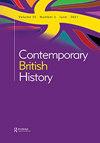Productive European cooperation between Britain and Germany: the Swansea-Mannheim town twinning partnership and exchanges between Wales and Baden-Württemberg, 1950-2000
IF 0.5
2区 历史学
Q1 HISTORY
引用次数: 2
Abstract
ABSTRACT This article investigates the town twinning partnership between Swansea (South Wales) and Mannheim (Baden-Württemberg, Germany) from its inception in the 1950s to the end of the twentieth century. Its findings contribute to scholarship on post-1945 European town twinning, a subject that has not received the attention it deserves, especially from academics working in Britain. The article’s arguments also complicate wider debates surrounding post-war popular relations between Britain and Germany, which have often been cast in existing work as ambivalent or outright hostile. The article adopts a regional approach—emphasising interactions between Wales and Baden-Württemberg rather than at the national level—to offer a new perspective on international relations between Britain and Germany, showing that inhabitants of Swansea and Mannheim forged warm friendships and made efforts to understand each other. The article also highlights the limitations of purely Anglocentric approaches to modern British history, drawing from interactions carried out under the aegis of the Swansea-Mannheim partnership to trace ways in which Welsh identity and the Welsh language shaped external perceptions of the British.英国和德国之间富有成效的欧洲合作:斯旺西-曼海姆镇的结对伙伴关系和威尔士和巴登-符腾堡州之间的交流,1950-2000
本文研究了斯旺西(南威尔士)和曼海姆(德国巴登-符腾堡州)从20世纪50年代开始到20世纪末的城市伙伴关系。它的发现有助于研究1945年后欧洲城镇结对的学术研究,这是一个没有得到应有关注的主题,尤其是在英国工作的学者。这篇文章的观点也使围绕战后英德关系的更广泛的争论复杂化,在现有的工作中,英德关系经常被描绘成矛盾或完全敌对的关系。这篇文章采用了一种地区性的方法——强调威尔士和巴登-符腾堡州之间的互动,而不是在国家层面上——为英国和德国之间的国际关系提供了一个新的视角,表明斯旺西和曼海姆的居民建立了温暖的友谊,并努力相互理解。这篇文章还强调了纯粹以英语为中心的方法研究现代英国历史的局限性,通过在斯旺西-曼海姆合作伙伴关系的支持下进行的互动来追溯威尔士身份和威尔士语言如何塑造了外部对英国人的看法。
本文章由计算机程序翻译,如有差异,请以英文原文为准。
求助全文
约1分钟内获得全文
求助全文
来源期刊

Contemporary British History
HISTORY-
CiteScore
1.40
自引率
14.30%
发文量
34
期刊介绍:
Contemporary British History offers innovative new research on any aspect of British history - foreign, Commonwealth, political, social, cultural or economic - dealing with the period since the First World War. The editors welcome work which involves cross-disciplinary insights, as the journal seeks to reflect the work of all those interested in the recent past in Britain, whatever their subject specialism. Work which places contemporary Britain within a comparative (whether historical or international) context is also encouraged. In addition to articles, the journal regularly features interviews and profiles, archive reports, and a substantial review section.
 求助内容:
求助内容: 应助结果提醒方式:
应助结果提醒方式:


